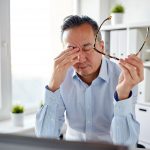Last updated on July 7th, 2023 at 02:09 pm
A somewhat surreal question but it was actually asked in an online forum, this particular user wondered how a zero gravity environment would affect his CPAP machine. I don’t know whether he’s a mate of Richard Branson, about to have a space holiday, but it’s an interesting topic regardless of this person’s motives.
Others chime in and split the question in two. How does zero gravity or weightlessness affect OSA and how does it affect CPAP?
I’m not aware of any scientific research done to this effect (wrong, see below) but it doesn’t hurt theorizing about the possible outcome. As someone in that forum thread mentions, the lack of gravity could mean the airway wouldn’t collapse in the first place, avoiding apnoea events altogether. Oftentimes it is indeed the soft palate at the top of the throat collapsing down, blocking the airway so without gravity, perhaps this wouldn’t happen. But if this tissue still hangs about like something floating in space, not necessarily pulling down but perhaps left or right, it could still narrow the airpipe and cause hypopnea events, still causing trouble to the heart, blood and body in general.
As far as the CPAP is concerned, I don’t think much would differ. As long as you’re inside a spacecraft with air available for the machine to pump around, nothing changes. The humidifier chamber may need adjusting to keep water inside and I suspect the dreaded rain-out is a non-issue as water wouldn’t drop back down. But as far as the basic idea of pumping air is concerned, I can’t think of any gravitation dependent components. If you are going on a space trip, do remember to strap the CPAP to your back, or somewhere else secure. And make sure the mask fits inside the helmet.
Discover Magazine has some related tips in their article called 20 Things You Didn’t Know About Living in Space. Most importantly for CPAP users, they report that fluids move upwards so nasal congestion is a common issue for astronauts. For that reason, perhaps consider hanging upside down! At number 6, they also confirm snoring reduces when in space, referring to this journal about the effects of microgravity on sleep-disordered breathing. So there is research after all!
With 16 sunrises a day, you can also expect a seriously disrupted bio-rhythm. Bring some shades or use bright light therapy to combat jet lag. You can probably forget about your 9 hour lie-in. Not that you would, when on the Virgin Galactic!
In a related thread on another forum, a scuba diver asks about using CPAP in a hyperbaric chamber. One person replies saying in the documentation of his wife’s CPAP, he finds no mention of use of CPAP in high oxygen environments. If these machines aren’t tested in such settings, it is advisable to not use them there without confirming with the manufacturer.
No doubt, we’ll have more space travel tips for CPAP users later 🙂

